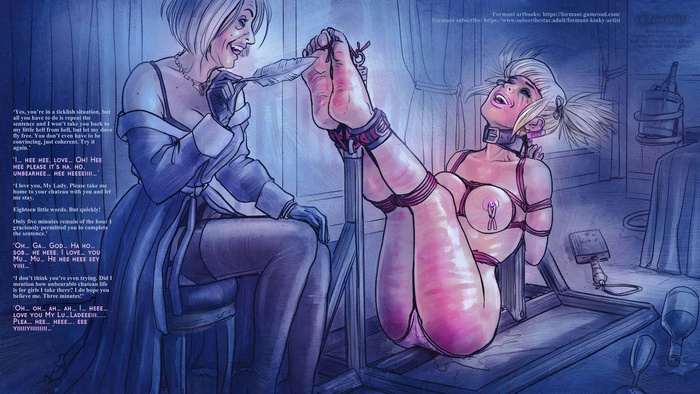Punishments and Rewards
articles and tutorials BDSM Mix Pain, punishment and torment in BDSM
Having good judgment, and a clear understanding of the processes involved, when administering both punishments and rewards is a vital part of maintaining a happy and healthy balance within the context of a Ds-based relationship.I personally believe that punishment is an area in which dominants can easily make errors in judgment, and that an overemphasis on punishments without considering rewards is counterproductive to Ds. I am going to outline three distinct forms of punishment/rewards that may exist within BDSM: role-playing or enactment, behavior modification, and catharsis. I will outline each of these in turn with the goal of making them distinct for the reader.

1. Role Playing and Role Enactment
"You've been a very naughty girl. Only dirty girls get wet like that, Daddy will have to turn you over his knee and spank you for being so bad."
Role-playing is a fundamental part of BDSM for many people, and it is something that is often done in the spirit of having fun. Sometimes punishment is an essential part of the role-play. Imagine a heavy scene in which a Nazi interrogates a lovely French girl whom he has taken as a prisoner. It just wouldn't be the same without including name calling, hair pulling, or even face slapping as punishments for not giving the desired response. In the case of role-playing games like this, "bad behavior" is desired, because it is the catalyst for the ensuing play punishment. In a sense, the punishment is the reward for all people involved.
Within the context of a Ds relationship there is a consensual power exchange between the dominant and the submissive(s), and each have complimentary roles. Even though most enter into a Ds relationship with good intentions, sometimes people can be forgetful and need subtle reminders regarding the nature of their relationship. I remember one night when we had a few people over for dinner, and my slave overstepped her bounds through a few smart assed remarks that illustrated that she forgot her place within our relationship. After being send to the corner, she was told her that in order to come back out she would have to sing the song "I'm a Little Tea Pot," complete with all of the arm and leg movements that go with it. She waited for a long while to compose herself, and when she realized that she was not going to get out of it she sang the song for all of the guests and me. It was fun, it was humiliating for her, and it was a case of punishment being used to help define the roles existing within our relationship. The reward for both of us is that we felt as though we reaffirmed what we are all about as a couple.
When a dominant exerts his "Studly Dominant Will" in order to show everyone who is boss, in my eyes it falls into the category of "gaudy displays of power." I think that although such gaudy displays of power are sometimes necessary to reaffirm certain rules or roles within a relationship, sometimes people go overboard with this type of behavior. When I see a dominant that feels the need to loudly, and continually, correct every tiny infraction from his submissive at public events I usually interpret it in one of two ways. Either the person is self conscious and lacking confidence, in which case he is "acting" out the role of a dominant instead of just "being" that role, or else the individual is overcompensating for having a particularly tiny flogger. There is no real reward for acting like this, only a noticeable lack of invitations to private parties and things of that nature.
2.Behavior Modification
Behavior modification is the process of replacing undesirable behavior with behavior that is desired. This process is made up of two complimentary parts. The first step is to eliminating "bad" behavior by either withdrawing positive reinforcement or inflicting negative reinforcement. If someone does something that is bad, a typical response within the context of a relationship is to withdraw positive reinforcement by withholding attention, sex, or affection. Negative reinforcement (which is also called "punishment") may be used as a response when undesirable behavior occurs. For example, when my slave does something that is on my list of no-no's, such as stomping her foot, sticking out her tongue, or swatting my ass, then the negative reinforcement I use to discourage this behavior takes the form of spanking her with the hard wooden spoon that she hates the most.
As the bad behaviors are eliminated (the process is called "extinction"), attention has to be paid to replacing the undesirable behaviors with new ones. The process of encouraging good behavior is also comprised of two parts. The first is the removal of negative reinforcement. For example, if I scowled at my slave because she allowed my drinking glass to become empty at a party, at the point when she realized her error and refilled my glass I would stop scowling. The other principal involved in establishing good behavior is to positively reinforce it when it occurs. If, for example, I wanted my slave to wear stockings at certain times I would want to acknowledge this when it happened by telling her that she is a good girl.
I see three huge issues with trying to use behavior modification in the context of BDSM orientated relationships. The first big pitfall occurs when a dominant uses the same BDSM action in a serious way to bring about a change in behavior and in a fun way during role-playing sessions. Let's say, for example, that the dominant likes to role-play Daddy/little girl scenes that wind up as spanking sessions. However, this same dominant may hate the fact that his slave spends all of her time on the computer while he is at work. He comes home, finds her on the computer, and spanks her for it. Because this is the same as the play punishment, is he actually punishing the bad behavior, or encouraging her to do it even more because it is like the spanking game that they both enjoy? I honestly believe that a lot of dominants reinforce bad patterns of behavior from their submissives because they do not draw clear lines between "play" and "punishment."
The second main issue with using behavior modification is that it is almost impossible to isolate behaviors, rewards, and punishments. I'll give a fictional example to illustrate what I mean by this.
Let's say that my slave and I are hosting a dinner party. There is a rule in place that she is to put her hair up when we have guests over. She gets home late, rushes to get things together, and forgets to put her hair up. The guests show up, everyone has fun, and after they leave it is brought to her attention that her hair was not up. I give her a nasty spanking, telling her "this is to remind you of the rules of the house." In a perfect world the spanking would be a negative reinforcement of behavior that is not desired, and it would lead to her remembering to follow this rule in the future.
In reality, however, it is more likely that she felt bad about not having her hair up the second that she noticed, and she started the process of beating herself up for it. She may feel useless, worthless, or that she is a bad slave long before the spanking starts. The spanking reaffirms in her mind that she is bad, so it actually is positively reinforcing the concept that she is bad. She experiences a drop in self-esteem and confidence that leads to more miscues in the future. My one bit of advice to dominants at this point is that a submissive who feels valued and who feels good about their ability to perform tasks will be far more pleasing, and far more capable of handling whatever it is that you ask of her. I am very performance-orientated, and I have high expectations. I personally feel that positive reinforcement on its own leads to greater results than focusing entirely on the punishment end of the equation.
The final issue that I have with mixing BDSM with behavior modification is that it looks a lot like abuse. The line that I personally draw is that if I am really upset or angry with my slave the SM stops. Many of the behaviors that I want to eliminate are those that make me frustrated or angry. If I do not want my slave, for example, to ignore me when I am talking because it makes me mad, then it is probably a pretty good bet that I should not even think about punishing her with some form of BDSM when this behavior happens. If I spank her when I am mad, what is the likelihood that I will go too hard? If I tell her to sleep on the floor because she did something that made me really angry, how would it make her feel in the end? What would these things do to our relationship? Would it lead to even more mistakes in the future on her part? What would it do to her level of respect for me? What would it do the respect that I have for myself?
3. Catharsis
For some individuals the pain of SM play is cathartic because it makes the inner emotional pain tangible, and thus possible to handle and manage. Many submissives have a history of cutting themselves, or participating in other forms of self-mutilation. This behavior sometimes carries over into the present, even if they are involved in stable relationships. My personal belief is that a lot of submissives carry a great deal of inner pain and guilt because of their desire to please and their need to be the ones who make things better for other people. The process of inflicting a punishment may have the effect of allowing the submissive to move on, and to get past things that make her feel extremely bad and/or guilty. When a dominant punishes a submissive to some degree it removes the need, and the right, for her to punish herself.
I promised myself years ago that I would never use a toy on my slave when she was feeling so hurt that she could not cope with it. I told myself, and her, that I would hold her and make the pain go away that way. I told her that striking her with a toy when she feels bad about herself would, in some twisted way, validate those feelings and reinforce her feelings of being "bad." I managed to keep that promise for a long while. I held her each and every time she was feeling bad and I was in arm's reach. I kissed her during those long nights when everything in her world felt so bad that she wanted to feel the pain of the lash instead. Then there was the one night that everything changed, and I saw that there was no other choice. I'm going to relate a story now that some people will find disturbing. Please stop reading now if this subject matter is difficult for you.
We were a bit of a rough ride with the Ds end of our lives a couple of years ago. At that point in time our lives were filled with stress and external pressures, and my slave carried an unbelievable amount of guilt over things that happened in her life. Fights would break out, bickering would start over all sorts of little things. But the little things were not the really problem, it was always the big things that lurked in the background and never seem to go away. After the bickering ended it always came out that the thing that was upsetting was actually one of those "externals", and not what we thought we were arguing about.
Our relationship bottomed out completely, and we spun into a cycle where the fighting and bickering led to attacks about how our Ds life was going. One night the only thing that stopped me from taking back my collar from my slave was that I could not bring myself to say the words "you are no longer my slave." Then we talked, as we always do. It was obvious that the issues were the same as always, those ever-present "external pressures" and guilt that hung over our lives and everything we were building together. I decided that it was time to break one of my hard limits, and do something that I told myself, and my slave, I would never do. It was a last ditch attempt to save us as a couple.

At the end it was like a light went on for both of us. She actually felt better. She told me that she felt like I was in control again, and that those feelings stuffed down inside of her made her feel like she (and I) did not have control. It was more than just a catharsis of emotions, or a simple absolution or sin. It was like taking hold of ship's rudder in the middle of a storm and being able to guide it safely again. Our reward as a couple was putting the past behind us to a degree, and once again having hope for what the future will hold.
The negative side to using punishment as a tool for catharsis is that the dominant has to be in total control of what is happening, and have fantastic judgment. The dominant also has to be able to say "no" if he feels that the submissive will be psychologically damaged, even if she asks him for this type of play. There is also a danger of overusing catharsis play, which may include the submissive becoming reliant of this type of release. The negative effects on the psyche of the person being "purged" or "cleansed" in this manner may not be apparent for quite some time, and if it is used often and without thought the cumulative effects can be devastating.
Summary and Suggestions
I personally believe that in order to use these tools effectively, a Dominant has to be able to take a step back, assess the situation, and establish clear lines between punishments and rewards. If the purpose of punishment is to lead into a play session, then punishments and rewards blur together. However, if the goal of punishment and praise is to replace undesirable behavior with another set of actions, it is necessary to keep the lines between punishment and reward very clear. The best suggestion I can give to avoid confusion between these different types of punishments and rewards is to be sure there is little or no overlap between how punishment is inflicted in each of these instances. When it comes to using BDSM play as catharsis to purge negative emotions, my best advice is to tread very carefully. The potential is there to do long lasting emotional and psychological damage to your partner, and this damage may not be apparent for a very long time. I think that it is a wise move to save that as a very last resort, to be used only when nothing else will do and when absolutely necessary. My final bit of advice is that rewards tend to have a far greater positive impact on an individual than punishments, and that saying “good girl” more often will have a greater positive effect on a Ds dynamic than a hundred punishment-orientated spankings.






